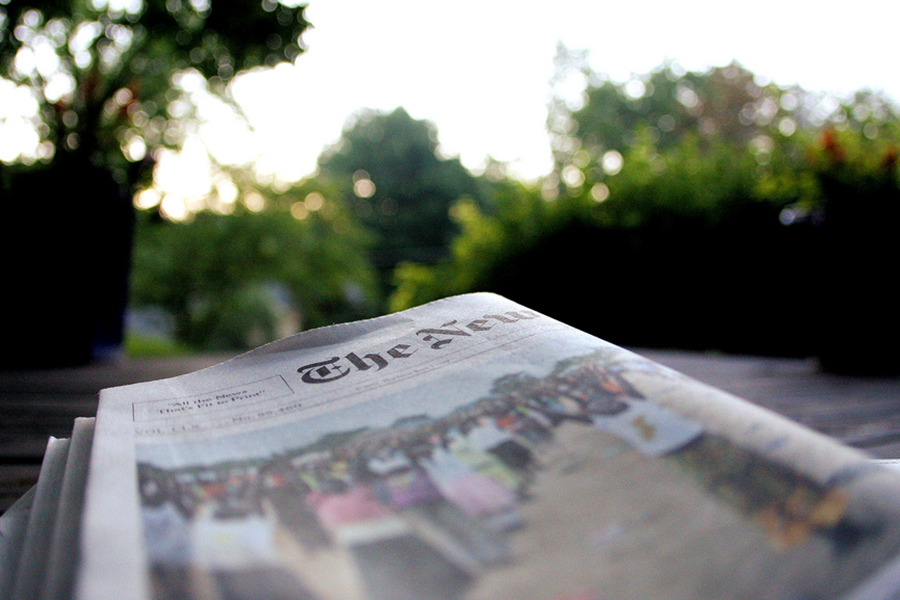
 Fish need water, and we need the news.
Fish need water, and we need the news.
There was a point in my life when I hated the news. News bookmarks on Chrome were deleted; political pages on Facebook were unliked; Sunday newspapers at coffee shops went unpurchased.
That attitude thankfully changed — and with it came a newfound thirst for updates that not only keep me informed as a citizen, but as a writer. There exists a romantic idea that the free press is synonymous with the word “America,” and it’s not entirely wrong.
This idea is a bit murkier in Russia, where state control of the media can make the lives of reporters opposed to Russian involvement in Ukraine and Syria exceedingly miserable. Citizens still require news, but the news they receive isn’t as sovereign as it could be.
Questions of independent reporting aside, finding news outside the purview of the Russian government is actually pretty easy. Website access to The New York Times and The Atlantic — not known for their favoritism toward Russia — is readily available, although loading The Aggie’s website requires an IP address change using a VPN.
Repressive? Not for an American student, even one with local interests in mind. There is a certain power in the free press, however, that I could only have discovered by living in Russia.
Recently, a Russian friend of mine — a fellow student — asked me to watch “The Post” with her at a movie theater in the heart of St. Petersburg. Newly released and fully dubbed in Russian, I couldn’t refuse. (I’ve seen it before, but watching a snarly Tom Hanks boss around a newsroom in another language is 10 times better.)
There was irony in watching a uniquely American film that explores media independence and government accountability — marking a turning point in our history — amid a sea of Russian movie-goers.
I wondered if the significance of the Vietnam War, the Pentagon Papers and the Watergate scandal was lost on them, just as the significance of the Siege of Leningrad from 1941 to 1944 is often lost on us.
After the movie, my friend and I talked about Watergate and the media’s role in ending an unpopular war and removing a crime-tainted president from office in the early 1970s.
What stood out most, however, was her wish that Russia’s media would eventually attain the independence of the American press, as codified in the First Amendment and later reaffirmed during the cultural bloodbath of the Vietnam era.
Her words struck a chord. We are two countries with a historical animosity that has produced tensions and saber-rattling, but also excellent spy novels and avenues for important cultural exchange. I’ve written before about the need to mend old wounds and move forward, to allow different worldviews to flourish with the same end-goals in mind.
In this case, an American movie in Russian dubbing unlocked a conversation that shows the power of our media. Our free press is one of America’s greatest strengths.
I had another conversation a few days after a school shooter killed 17 people in Parkland, Fla., and it was just as illuminating. My Russian hostess, with a measured dose of wisdom, offered the following: In Russia, there are crazy people, too — they just don’t have the same access to guns as we do in America.
Her implication is obvious. I’ve felt the same for years, but hearing it from a Russian’s point of view — one born during the Soviet era, at that — felt strangely liberating. It was a moment of shared reflection that bore an uncomfortable truth.
Our culture of violence, mostly manifested through an obsession with guns, is one of America’s greatest failings.
I am never more proud to be an American than when I travel abroad, and I suspect it’s the same for many others. Traveling is a form of representation — we present the world an individual version of the American collective. But I can’t help but feel the burden of my country’s problems, even as I represent its assets.
The good and the bad, the beautiful and the ugly — they can make their case known in every society on the planet. Ask around and you’ll find people criticizing their own government as much as anything else, even as they proudly wave its flag. This sentiment exists in America, and it exists in Russia. How’s that for news?
Written by: Nick Irvin — ntirvin@ucdavis.edu
Disclaimer: The views and opinions expressed by individual columnists belong to the columnists alone and do not necessarily indicate the views and opinions held by The California Aggie.



